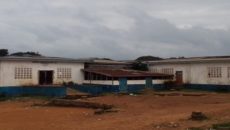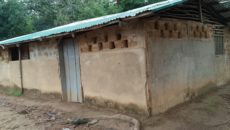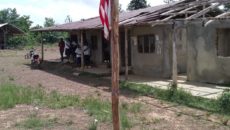GOMPA, Nimba – On Feb. 20, the Ministry of Education held a one-day event that sought to present the activities of its effort to see 93 government schools operated by private and non-profit organizations.
The event was part of a larger three-day conference that continued until Feb. 22 and featured donors who had been supporting the Partnership Schools for Liberia initiative.
The event, which was held at Jackie’s Guest House, also brought together high profile individuals from the Liberian Government, including President Ellen Johnson Sirleaf, Education Minister George Werner, Finance and Development Planning Minister Boima Kamara, and representatives from the operators of the Partnership Schools.
The overall conference was aimed at evaluating the impact of the Partnership Schools, which includes operators such as Bridge International Academies; BRAC, a development organization dedicated to alleviating poverty by empowering the poor; More Than Me, the all-girls school network; and the Liberian Youth Network.
In a brief opening remark, Werner said while it was a difficult start to implementing the Partnership Schools initiative, “we sought help from where we could, and we got help.â€
The education minister said the government’s design for the pilot program ensured that it would be acceptable both in and out of Liberia.
However, he said while the initiative is important, his team has also been simultaneously implementing systems at the Ministry of Education to support this private-public partnership. [Disclosure: The Bush Chicken’s parent company provides a public relations consulting service to the Ministry of Education]
“We had several initiatives in the ministry,†Werner said. “We could not have Partnership Schools for Liberia without looking at some issues about our pay and payroll management system – testing our teachers, training them to make sure they have the right capacity to deliver. We say thank you for being true partners on this journey.â€
Also making comments was President Sirleaf, who named the education sector as one of the significant challenges her government has faced since she was elected.
“When this government started in 2006, we recognized that education was a number one priority, and we had to do something about our children who had been out of school for a couple of decades – most of them child soldiers,†she said.
Noting the limited resources of the country, Sirleaf stressed that there was a need for external support to aid her government in revamping the education sector.
“Something was practically lacking – the quality of education,†Sirleaf said. “We needed to do something about this, and this is what came about – Partnership Schools.â€
According to a Ministry of Education press release, the schools involved within the initiative will remain “within the public sector, owned, financed, regulated and quality assured by the government, with support from external donors, and free to all students.â€
“Ultimately, if the data is compelling, PSL will serve as a cornerstone of the Ministry of Education going forward, focusing on providing inclusive, quality education, improving the management of schools, increasing training for teachers, and fully implementing the Liberian National Curriculum, all while ensuring needed improvements to infrastructure are addressed, and that teachers and students are equipped with the materials they need to succeed,†the release continued.
Justin Sandefur of the Center for Global Development, which is part of the team evaluating the initiative, gave a brief overview of the work expected of his team before adding, “We have seen some gains, and there are significant improvements already – all dramatic.â€
The conference continued across Liberia with tours of both ordinary and PSL government schools, presentations by operators in Liberia, along with a banquet with donors and partners that were headlined by Vice President Joseph Boakai.
Featured photo courtesy of Lloyd Massah



